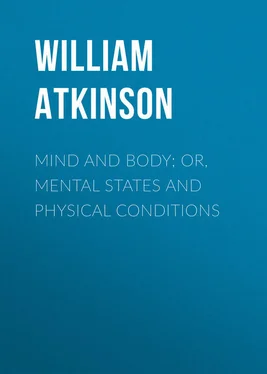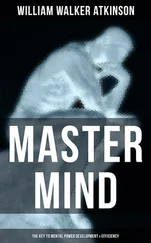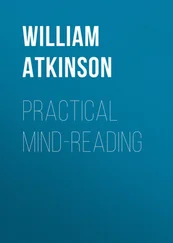William Atkinson - Mind and Body; or, Mental States and Physical Conditions
Здесь есть возможность читать онлайн «William Atkinson - Mind and Body; or, Mental States and Physical Conditions» — ознакомительный отрывок электронной книги совершенно бесплатно, а после прочтения отрывка купить полную версию. В некоторых случаях можно слушать аудио, скачать через торрент в формате fb2 и присутствует краткое содержание. Жанр: foreign_antique, foreign_prose, на английском языке. Описание произведения, (предисловие) а так же отзывы посетителей доступны на портале библиотеки ЛибКат.
- Название:Mind and Body; or, Mental States and Physical Conditions
- Автор:
- Жанр:
- Год:неизвестен
- ISBN:нет данных
- Рейтинг книги:3 / 5. Голосов: 1
-
Избранное:Добавить в избранное
- Отзывы:
-
Ваша оценка:
- 60
- 1
- 2
- 3
- 4
- 5
Mind and Body; or, Mental States and Physical Conditions: краткое содержание, описание и аннотация
Предлагаем к чтению аннотацию, описание, краткое содержание или предисловие (зависит от того, что написал сам автор книги «Mind and Body; or, Mental States and Physical Conditions»). Если вы не нашли необходимую информацию о книге — напишите в комментариях, мы постараемся отыскать её.
Mind and Body; or, Mental States and Physical Conditions — читать онлайн ознакомительный отрывок
Ниже представлен текст книги, разбитый по страницам. Система сохранения места последней прочитанной страницы, позволяет с удобством читать онлайн бесплатно книгу «Mind and Body; or, Mental States and Physical Conditions», без необходимости каждый раз заново искать на чём Вы остановились. Поставьте закладку, и сможете в любой момент перейти на страницу, на которой закончили чтение.
Интервал:
Закладка:
Mind and Body; or, Mental States and Physical Conditions
FOREWORD
Mind and Body – Mental States and Physical Conditions! To the mind of those who have contented themselves with merely the superficial aspects of things, these two things – mind and body; and mental states and physical conditions – seem to be as far apart as the two poles; seem to be opposites and contradictories impossible of reconciliation. But to those who have penetrated beneath the surface of things, these two apparent opposites are seen to be so closely related and inter-related – so blended and mingled together in manifestation – that it is practically impossible to scientifically determine where the one leaves off and the other begins. And so constant and close is their mutual action and reaction, that it often becomes impossible to state positively which is the cause and which the effect.
In the first place, Science now informs us that in all living substance, from cell to mammoth, there is and must be Mind. There can be no Life without Mind. Mind, indeed, is held to be the very “livingness” of Life – the greater the degree of manifestation of Mind, the higher the degree of Life. Moreover, the New Psychology informs us that upon the activities of the Subconscious Mind depend all the processes of physical life – that the Subconscious Mind is the essence of what was formerly called the Vital Force – and is embodied in every cell, cell-group or organ of the body. And, that this Subconscious Mind is amenable to suggestion, good and evil, from the conscious mind of its owner, as well as from outside. When the subject of the influence of Mental States upon Physical Conditions is studied, one sees that the Physical Condition is merely the reflection of the Mental State, and the problem seems to be solved, the mystery of Health and Disease solved. But in this, as in everything else, there is seen to be an opposing phase – the other side of the shield. Let us look at the other side of the question:
Just as we find that wherever there is living substance there is Mind, so do we find that we are unable to intelligently consider Mind unless as embodied in living substance. The idea of Mind, independent of its substantial embodiment, becomes a mere abstraction impossible of mental imaging – something like color independent of the colored substance, or light without the illuminated substance. And just as we find that Mental States influence Physical Conditions, so do we find that Physical Conditions influence Mental States. And, so the problem of Life, Health and Disease once more loses its simplicity, and the mystery again deepens. The deeper we dig into the subject, the more do we become impressed with the idea of the universal principle of Action and Reaction so apparent in all phenomena. The Mind acts upon the Body; the Body reacts upon the Mind; cause and effect become confused; the reasoning becomes circular – like a ring it has no beginning, no end; its beginning may be any place we may prefer, its ending likewise.
The only reconciliation is to be found in the fundamental working hypothesis which holds that both Mind and Body – both Mental States and Physical Conditions – are the two aspects of something greater than either – the opposing poles of the same Reality . The radical Materialist asserts that the Body is the only reality, and that Mind is merely its “by-product.” The Mentalist asserts that the Mind is the only reality, and that the Body is merely its grosser form of manifestation. The unprejudiced philosopher is apt to stand aside and say: “You are both right, yet both wrong – each is stating the truth, but only the half-truth.” With the working hypothesis that Mind and Body are but varying aspects of the Truth – that Mind is the inner essence of the Body, and Body the outward manifestation of the Mind – we find ourselves on safe ground.
We mention this fundamental principle here, for in the body of this book we shall not invade the province of metaphysics or philosophy, but shall hold ourselves firmly to our own field, that of psychology. Of course, the very nature of the subject renders it necessary that we consider the influence of psychology upon physiology, but we have remembered that this book belongs to the general subject of the New Psychology, and we have accordingly emphasized the psychological side of the subject. But the same material could have been used by a writer upon physiology, by changing the emphasis from the psychological phase to the physiological.
We have written this book to reach not only those who refuse to see the wonderful influence of the Mental States over the Physical Conditions, but also for our “metaphysical” friends who have become so enamored with the power of the Mind that they practically ignore the existence of the Body, indeed, in some cases, actually denying the existence of the latter. We believe that there is a sane middle-ground in “metaphysical healing,” as there is in the material treatment of disease. In this case, not only does Truth lie between the two extremes, but it is composed of the blending and assimilation of the two opposing ideas and theories. But, even if the reader does not fully agree with us in our general theories and conclusions, he will find within the covers of this book a mass of facts which he may use in building up a new theory of his own. And, after all, what are theories but the threads upon which are strung the beads of facts – if our string does not meet with your approval, break it and string the beads of fact upon a thread of your own. Theories come, and theories go – but facts remain.
CHAPTER I
THE SUBCONSCIOUS MIND
In order to understand the nature of the influence of the mind upon the body – the effect of mental states upon physical functions – we must know something of that wonderful field of mental activity which in the New Psychology is known as “The Subconscious Mind,” and which by some writers has been styled the “Subjective Mind;” the “Involuntary Mind;” the “Subliminal Mind;” the “Unconscious Mind,” etc., the difference in names arising because of the comparative newness of the investigation and classification.
Among the various functions of the Subconscious Mind, one of the most important is that of the charge and control of the involuntary activities and functions of the human body through the agency of the sympathetic nervous system, the cells, and cell-groups. As all students of physiology know, the greater part of the activities of the body are involuntary – that is, are independent (or partly so) of the control of the conscious will. As Dr. Schofield says: “The unconscious mind, in addition to the three qualities which it shares in common with the conscious — viz. , will, intellect and emotion – has undoubtedly another very important one – nutrition, or the general maintenance of the body.” And as Hudson states: “The subjective mind has absolute control of the functions, conditions and sensations of the body.” Notwithstanding the dispute which is still raging concerning what the Subconscious mind is , the authorities all agree upon the fact that, whatever else it may be, it may be considered as that phase, aspect, part, or field of the mind which has charge and control of the greater part of the physical functioning of the body.
Von Hartmann says: “The explanation that unconscious psychical activity itself appropriately forms and maintains the body has not only nothing to be said against it, but has all possible analogies from the most different departments of physical and animal life in its favor, and appears to be as scientifically certain as is possible in the inferences from effect to cause.” Maudsley says: “The connection of mind and body is such that a given state of mind tends to echo itself at once in the body.” Carpenter says: “If a psychosis or mental state is produced by a neurosis or material nerve state, as pain by a prick, so also is a neurosis produced by a psychosis. That mental antecedents call forth physical consequents is just as certain as that physical antecedents call forth mental consequents.” Tuke says: “Mind, through sensory, motor, vaso-motor and trophic nerves, causes changes in sensation, muscular contraction, nutrition and secretion… If the brain is an outgrowth from a body corpuscle and is in immediate relation with the structures and tissues that preceded it, then, though these continue to have their own action, the brain must be expected to act upon the muscular tissue, the organic functions and upon the nervous system itself.”
Читать дальшеИнтервал:
Закладка:
Похожие книги на «Mind and Body; or, Mental States and Physical Conditions»
Представляем Вашему вниманию похожие книги на «Mind and Body; or, Mental States and Physical Conditions» списком для выбора. Мы отобрали схожую по названию и смыслу литературу в надежде предоставить читателям больше вариантов отыскать новые, интересные, ещё непрочитанные произведения.
Обсуждение, отзывы о книге «Mind and Body; or, Mental States and Physical Conditions» и просто собственные мнения читателей. Оставьте ваши комментарии, напишите, что Вы думаете о произведении, его смысле или главных героях. Укажите что конкретно понравилось, а что нет, и почему Вы так считаете.












